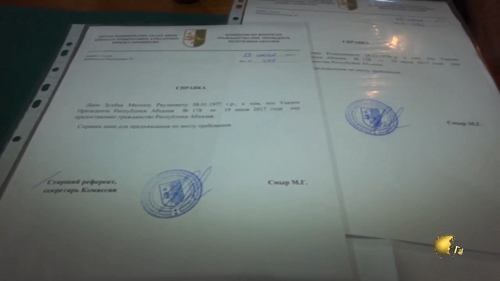Sokhumi Grants Citizenship to Georgians Willing to ‘Return to Abkhaz Roots’

Decree signed by Raul Khajimba granting Abkhaz citizenship to Gali residents willing to change their ethnicity, July 26, 2017. Photo: Galtv
Russian-backed authorities in Sokhumi will grant the “citizenship passports” to those ethnic Georgians, who would be willing to change their ethnic identity from Georgian to Abkhaz and who would address the region’s “president” for such request, said Temur Nadaraia, head of the administration of Gali District, Abkhazia’s easternmost district predominantly populated by ethnic Georgians.
“No one can say that this was forced and that someone pushed you to do so, this was your voluntary application to the president requesting him to grant you the citizenship and restore your historic last names and ethnicity,” Nadaraia stated on July 26 at the meeting of the heads of the “Murzakan* Abkhaz Council,” an organization established in 2014 for promoting "the integration of the descendants of Murzakan Abkhaz,” with the three dozen local residents willing to change their ethnic identity.
“You have such an opportunity and you will be receiving a passport indicating your ethnic belonging as Abkhaz and the last names without the changes that were done during the times of [Joseph] Stalin and [Lavrenti] Beria,” Nadaraia noted, echoing the claims of the Abkhaz leadership that part of the local population in Gali District, which is home to the region’s 40,000-some ethnic Georgian population, has been “Georgianized” during the Soviet Union.
At the same meeting, Edisher Zukhba, deputy head at the “Murzakan Abkhaz Council,” read the July 19 decrees of Raul Khajimba, the region’s leader, granting the Abkhaz “citizenship” to the first 31 applicants.
Jemal Gamakharia, Deputy Chairman of the Abkhazian Supreme Council – Tbilisi-based legislature of Abkhazia – issued a statement on July 21, saying that “unfortunately, the occupation regime in Abkhazia continues to conduct totally unacceptable experiments on the Georgian population” in Gali District.
The Deputy Chairman called the latest initiative “a new form of discrimination against Georgians – an attempt to forcefully change their ethnicity.” He added that the authors of the “pseudo-historical theory” that the identity of locals was changed during the Soviet times “know better than anyone else that they are shamelessly lying.”
The decision comes less than two weeks after Sokhumi started distributing “residence permits” to the ethnic Georgians of Gali District, allowing them to retain Georgian citizenship, to reside in the region, to sell and bequeath property and travel to the rest of Georgia, but depriving them of full political rights and the right to purchase property.
Conference of the “Murzakan Abkhaz”
The July 26 meeting comes a week after the first conference of the “Murzakan Abkhaz Council,” held on July 19 during the celebration of 85 years since Gali was granted the status of a city.
The resolution adopted by the “Murzakan Abkhaz Council” claimed that the identities and the last names of the “residents of the eastern areas of Abkhazia” had been changed into Georgian ones “during the time of Stalin and Beria,” and called on the residents to “recall their ancestry and do everything possible to go back to their [Abkhaz] roots.” It also calls on the authorities to support this process.
The region’s Russia-backed leader Raul Khajimba issued a statement, read at the conference by “prime minister” Beslan Bartsits, implying that the Gali residents were in truth Abkhaz, with the Georgian identity forced upon them in the Soviet period. Khajimba said in his statement that “nevertheless the ethnic memory is alive and there are ongoing processes to restore the national identity of the native people.”
Deputy head of the “Murzakan Abkhaz Council” Edisher Zukhba said that the presence of high-level Abkhaz officials at the conference meant that “the goals and tasks set before our civic organization – the Murzakan Abkhaz Council – are objectives at the state level [as well].”
According to Zukhba, the organization had been assessing the potential targets for identity change among Gali District residents “for three months, with the help from the authorities,” and added that they have already identified over 4 500 individuals as such targets. To enhance the identity change process, Zukhba suggested opening of a boarding school in Gali, where “particular attention and priority will be given to studying the Abkhaz language and literature, and history of Abkhazia.”
* The newly introduced term “Murzakan Abkhaz” is based on Samurzakano, historical name of the area which included the Gali District’s territory.
This post is also available in: ქართული (Georgian) Русский (Russian)